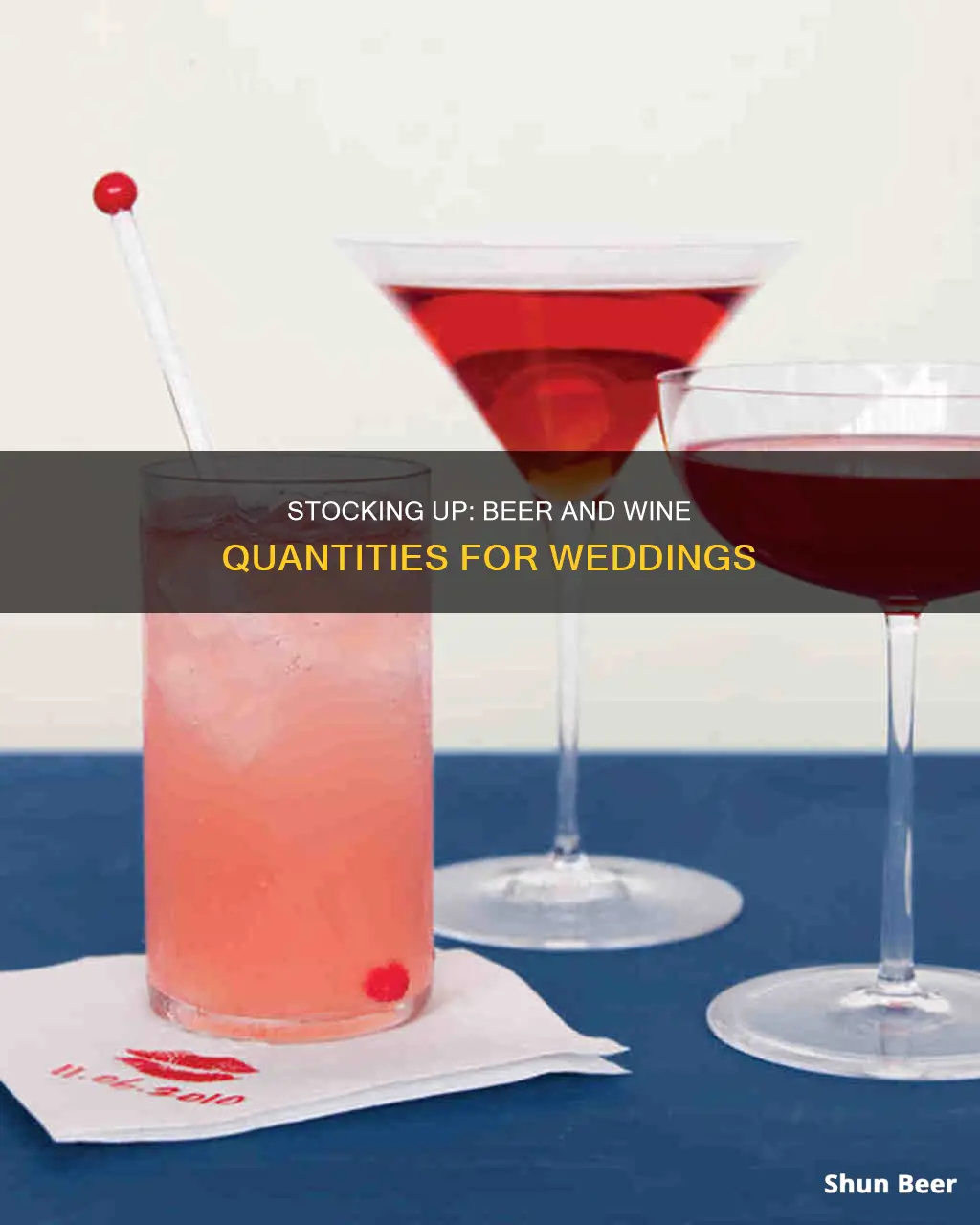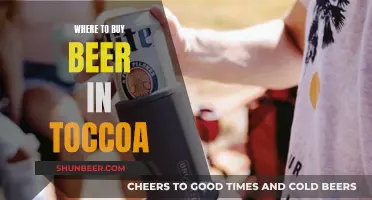
Planning a wedding can be stressful, from finding the perfect dress to creating a seating chart. One of the most important considerations is the amount of alcohol to buy. While there is no perfect answer, it is better to have more than enough than to run out. A common estimate is that guests will have two drinks in the first hour and one drink per hour after that. The type of alcohol served is also a factor – a full bar will require a variety of liquors, mixers, wines, and beers, while a limited bar with just wine and beer will need larger quantities. The drinking habits of guests should also be considered – a group of heavy drinkers will require more alcohol than light drinkers. To simplify the process, wedding drink calculators are available online to help estimate the amount of alcohol needed based on guest count, duration of the event, and type of alcohol.
What You'll Learn

How much alcohol to buy for your wedding size
There are many variables to consider when determining how much alcohol to buy for a wedding. The general rule of thumb is to provide enough alcohol for two drinks per person for the first hour of the wedding and one drink per person for each additional hour. However, this may vary depending on the drinking habits of your guests. If you are expecting a lot of heavy drinkers, you may want to purchase more alcohol than if your guests are mostly light drinkers.
The type of alcohol served will also impact the quantity needed. If you are offering a full bar, you will need a variety of liquors, mixers, wines, and beers. If you are only serving wine and beer, you will need less variety but may need to purchase larger quantities. According to retailers, 70-80% of wedding guests will drink beer and wine, while 20-30% will drink spirits.
For a typical wedding with a ratio of 50% liquor, 25% beer, and 25% wine, here is an estimate of how much alcohol you will need for 100, 150, and 200 guests over a duration of 5 hours, including a champagne toast, and assuming average drinking:
- 100 guests: 17 bottles of champagne, 10 bottles of red wine, 10 bottles of white wine, 11 bottles of spirits, and 100 cans or bottles of beer.
- 150 guests: 25 bottles of champagne, 15 bottles of red wine, 15 bottles of white wine, 16 bottles of spirits, and 150 cans or bottles of beer.
- 200 guests: 33 bottles of champagne, 20 bottles of red wine, 20 bottles of white wine, 21 bottles of spirits, and 200 cans or bottles of beer.
It is important to note that these are just estimates, and the actual amount of alcohol needed may vary depending on the specific circumstances of your wedding. It is always better to err on the side of caution and have more than enough rather than run out during the event.
Buying Beer After Midnight in Oklahoma: What's the Deal?
You may want to see also

How to calculate wedding alcohol and wine
Planning a wedding can be stressful, and figuring out how much alcohol to buy for your big day is no easy task. To ensure you have enough drinks for your guests, there are several factors to consider.
Firstly, it's essential to know the number of guests who will be attending and their drinking preferences. If you are aware of any non-drinkers, you can exclude them from your calculations. The drinking habits of your guests should also be considered; if you anticipate many heavy drinkers, you may need to purchase more alcohol.
Secondly, decide on the type of alcohol you want to serve. A full bar with various liquors, mixers, wines, and beers will require a more extensive selection and potentially larger quantities. On the other hand, if you opt for only wine and beer, you may need less variety but more significant amounts.
The duration of your wedding also impacts the amount of alcohol needed. A common estimate is that guests will consume two drinks in the first hour and one drink per hour after that. However, this can vary depending on the age of your guests and their drinking habits.
To calculate the total number of drinks needed, you can use the following formula:
> Number of guests x number of hours x drinks per hour = total number of drinks
For example, if you have 100 guests and your wedding lasts for 5 hours, with an average of 1.5 drinks per person per hour, you would need:
100 guests x 5 hours x 1.5 drinks/hour = 750 drinks
Round up to the nearest hundred to ensure you have enough, so in this case, you'd need 800 drinks.
Now, let's break this down by type of alcohol. A typical ratio of alcohol served at weddings is 1/3 beer, 1/3 liquor, and 1/3 wine. So, for the example above, you would need:
- Beer: 800 drinks / 3 = 267 servings of beer (assuming 12 oz. per serving)
- Liquor: 800 drinks / 3 = 267 servings of liquor (1.5 oz. is a standard shot size)
- Wine: 800 drinks / 3 = 267 servings of wine (5 oz. per serving)
When it comes to the types of wine, it's a good idea to offer a sparkling wine, a white wine, and a red wine. If you are having a champagne toast, factor that into your calculations as well.
Keep in mind that these are just estimates, and it's always better to err on the side of caution and have a little extra. You can also take a poll or just wing it to get a more accurate idea of your needs.
Lastly, don't forget to include mixers and garnishes in your calculations, as well as any signature cocktails or cultural traditions you plan to incorporate into your bar menu.
Where to Buy Beer on New Year's Day in Georgia
You may want to see also

How many bottles of wine for a wedding
Planning a wedding can be stressful, and figuring out how much wine to buy is an important part of the process. The last thing you want is to run out of wine during the celebration or be left with too much leftover wine, resulting in wasted money.
The general rule of thumb is to plan for each guest to have two drinks during the first hour and one drink for each additional hour of the event. So, for a 5-hour wedding reception, each guest would have a total of 7 drinks. However, this estimate can vary depending on the drinking habits of your guests. If you are expecting a lot of heavy drinkers, you may want to purchase more alcohol than if your guests are mostly light drinkers.
To determine the number of bottles of wine needed, consider that a standard wine bottle typically holds around 5 glasses of wine. So, for example, if you have 100 guests, you would need a total of 500 drinks, which equates to 100 bottles of wine.
It is also important to offer a variety of wine options to your guests. A typical ratio of wine to serve at a wedding is one-third red wine and two-thirds white wine. You may also want to include a sparkling wine option, such as champagne, for a toast.
Additionally, don't forget to consider other factors such as the time of day, season, and climate of your wedding. If you're hosting a brunch or lunch wedding, you may need less wine, while a summer or warmer climate wedding may require more white wine.
In summary, calculating the number of bottles of wine for a wedding depends on the number of guests, their drinking habits, the duration of the event, and the type of wine being served. By using these estimates and calculations, you can ensure you have enough wine to keep the celebration going without breaking your budget.
Buying Beer Late in Virginia: What Time Is Too Late?
You may want to see also

How much beer for a wedding
Planning a wedding can be stressful, and figuring out how much beer to buy is no exception. The amount of beer you'll need depends on several factors, including the number of guests, the duration of the reception, and the drinking habits of your guests. Here are some guidelines and calculations to help you estimate how much beer to buy for your wedding.
First, it's important to know how many guests will be attending your wedding and how many of them are of legal drinking age. This will give you a starting point for your estimations. If you know that some of your guests are non-drinkers, you can subtract them from your total count.
Next, consider the general rule of thumb for alcohol consumption at events: plan for each guest to have two drinks during the first hour and one drink for each additional hour. This rule can be adjusted based on your knowledge of your guests' drinking habits. If you expect a lot of heavy drinkers, you may need to purchase more beer. On the other hand, if most of your guests are light drinkers, you may not need as much.
Now, let's calculate the amount of beer needed. Assuming you have 100 guests and a 5-hour reception, you can estimate the total number of drinks consumed as follows:
2 drinks per guest during the first hour x 100 guests = 200 drinks
1 drink per guest for each additional hour x 100 guests x 4 hours = 400 drinks
Total drinks needed = 200 + 400 = 600 drinks
Since one standard beer bottle or can is typically 12 ounces, and there are 165 12-ounce servings in a keg, you can calculate the number of beer servings as follows:
Number of kegs needed = 600 drinks / 165 servings per keg = 3.6 kegs
So, for this example, you would need approximately four kegs of beer to cater to 100 guests for a 5-hour reception.
However, it's important to remember that not all your guests will necessarily drink beer. Some may prefer wine or cocktails. A typical ratio of alcohol served at a wedding is one-third beer, one-third liquor, and one-third wine. You can adjust this ratio based on your knowledge of your guests' preferences. If you know your friends are craft beer enthusiasts, you may want to offer a wider selection.
Additionally, it's always a good idea to err on the side of caution and buy slightly more than you think you'll need. You don't want to run out of drinks during the celebration.
In conclusion, determining the right amount of beer for your wedding involves considering the number of guests, the duration of the reception, their drinking habits, and the types of alcohol offered. By making careful estimations and calculations, you can ensure your guests have a great time without breaking your budget.
Thanksgiving Alcohol Laws in Texas: Beer and Wine?
You may want to see also

Bar options for weddings
There are a few different bar options to consider for your wedding. Each has its own advantages and disadvantages, so it's important to choose the one that best suits your needs and preferences. Here are some of the most common bar options:
Open Bar
An open bar is one of the most popular choices for weddings. It allows guests to drink as much as they want without having to pay for their drinks. This option can be expensive for the host, but it ensures that your guests have a good time. It is a gracious approach, but it is important to set a budget and communicate it to the bartender in advance to avoid overspending.
Cash Bar
With a cash bar, guests pay for their own drinks. This option can help you maintain your budget, but it may not be well-received by your guests. It is important to ensure that there is enough alcohol available for all guests, and to communicate the cash bar arrangement in advance so that guests come prepared.
Limited Bar
A limited bar typically serves only beer and wine, with no liquor. This option can be more affordable than a full open bar, as it requires less variety and may result in less consumption. According to retailers, 70-80% of guests prefer beer and wine, so this option is likely to satisfy most of your guests.
Non-Alcoholic Bar
If you, your families, and most of your guests do not drink alcohol, you can skip the alcoholic beverages altogether. A non-alcoholic bar can serve mocktails, sparkling water, and soda. You can even include something festive for toasting, like sparkling cider.
DIY Bar
With a DIY bar, you buy your own alcohol, mixers, and garnishes, and hire bartenders to serve the drinks. This option gives you more control over the selection and quantity of drinks, but it also requires more planning and estimation on your part. You will need to consider the drinking habits of your guests and the duration of the event to ensure you have enough drinks for everyone.
How Much Alcohol to Buy
No matter which bar option you choose, calculating the amount of alcohol needed for your wedding can be tricky. A common estimate is that guests will consume two drinks in the first hour and one drink per hour after that. However, this may vary depending on the age and drinking habits of your guests. It is always better to err on the side of caution and have more drinks than you think you need rather than run out during the event.
Online calculators and formulas can help you estimate the amount of alcohol needed based on the number of guests and the duration of the event. These tools take into account factors such as guest count, duration of the reception, drinking habits, and the type of alcohol being served.
In addition to the amount of alcohol, don't forget to include the costs of mixers, garnishes, ice, and other bar essentials in your budget.
Buying Beer in Utah: Gas Stations and Beyond
You may want to see also
Frequently asked questions
The general rule of thumb is to have enough alcohol for two drinks per person per hour of your wedding. This includes all alcohol: wine, beer, and liquor. A typical ratio of alcohol to serve at a wedding is 1/3 beer, 1/3 liquor, and 1/3 wine per guest.
For 100 guests, you will need 1,000 total drinks. If you are only serving wine, you will need 100 bottles of wine.
If you think your guests will be half beer drinkers and half wine drinkers, you'll need 500 servings of wine (100 bottles) and 500 servings of beer (500 cans/bottles).







